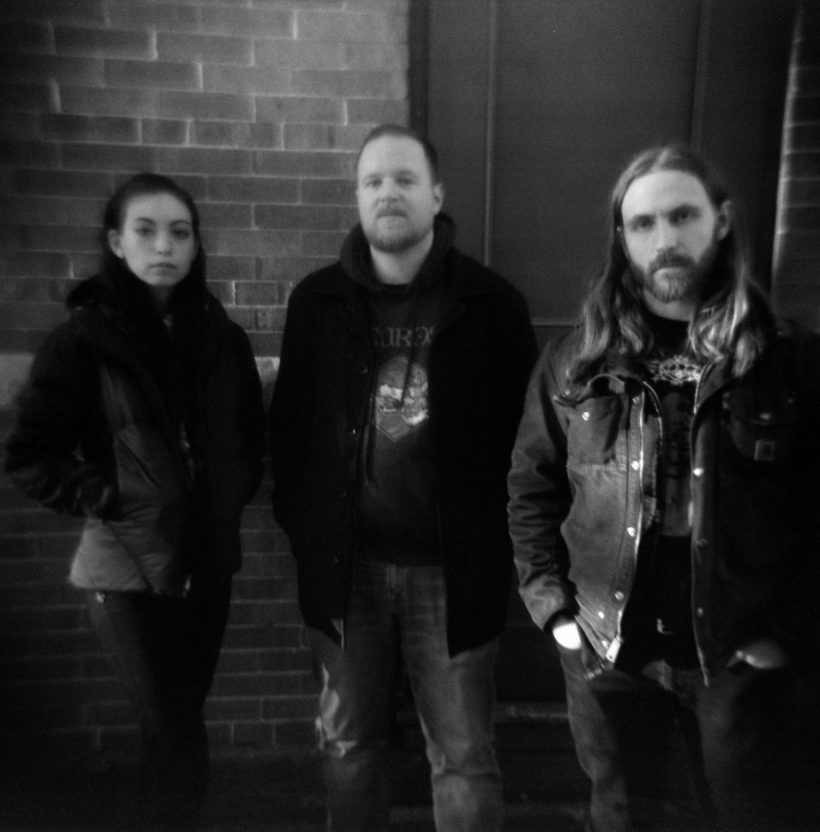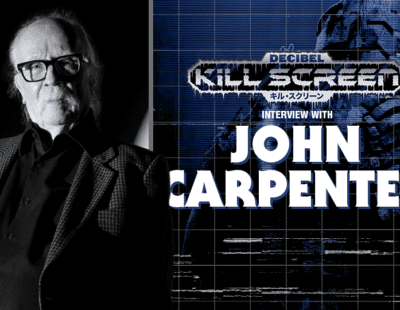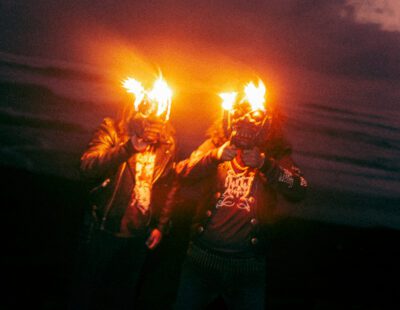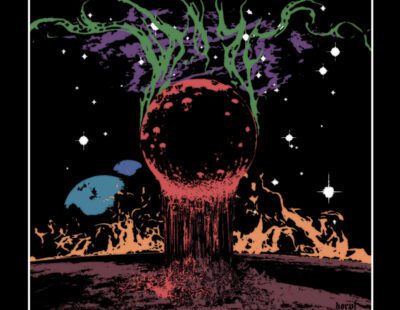
Death/doom, doom/death, death-influenced doom, or doom-influenced death, whatever the strain or permutation of the two genres, New York-based Weeping Sores exemplifies both. Formed by Pyrrhon/Seputus vocalist Doug Moore as a way to get his guitar chops in competitive order, Weeping Sores is surprisingly rooted all the things that aren’t as they seem. Flanked by fellow Pyrrhon/Seputus drummer Stephen Schwegler and violinist Gina Hendrika Eygenhuysen (currently live bassist for Tchornobog), Moore’s economical approach to death/doom or doom/death feels complex, unorthodox, yet somehow familiar, as if My Dying Bride (mainly the violins) swapped bodies with Morbid Angel (the slow, weird stuff) and the resultant entity was all-too sentient.
Musically, Weeping Sores are coming off their debut full-length, False Confession, their first for Italian indie I, Voidhanger Records. On False Confession, Moore strings together his penchant for discordant, heavy, melancholic, angst-ridden, and off-kilter death metal with his love of proggy sludgy doom. That is to say, while Weeping Sores have a tangential relationship with, say, the Peaceville Three, there’s more in common with Morbid Angel, Immolation, Rwake, and Giant Squid. Nevertheless, there’s morose doom afoot across False Confession‘s six tracks — running at 56 minutes, natch — which is evident not only when Eygenhuysen bows deeply into notes of sorrow, but also when Moore detaches from his angularisms into semi-smooth legato.
Decibel and Moore get our feet gooey in wet eczema as we run through Weeping Sores’ post-release euphoria.
How did the Weeping Sores project get started? Your main band, Pyrrhon, is a bit different in style.
Doug Moore: Weeping Sores arose primarily as a method for encouraging myself to play guitar more often. Guitar was my first proper instrument — I picked it up significantly before I started tooling around with metal vocals, which later became my primary “instrument” when I joined Pyrrhon. I contributed riffs and songwriting ideas to Pyrrhon from the start, but since I didn’t have to execute any of the material I was writing, I found it hard to maintain a regular guitar practice. As a result, my chops began to atrophy, and it got harder and harder for me to approach playing on a psychological level. I was bitching about this to Dylan [DiLella] from Pyrrhon one evening about five years ago when he suggested that I restart my guitar practice by writing some comparatively simple, easy-to-play metal for a personal side project. Weeping Sores was effectively born during that conversation.
How did you arrive at the name Weeping Sores come from? It’s sort of a romantic way of saying Wet Eczema, which is more Carcass than My Dying Bride.
Doug Moore: I deliberately didn’t put a whole lot of thought into the name. It was the first name idea I thought of and I just rolled with it, since I despise waffling between band name options. Subconsciously, I was probably aware from the beginning that the band would combine a melancholy harmonic sensibility with some more gruesome death metal techniques, and “weeping sores” was a familiar phrase that seemed to capture the feel of both of those elements. Plus, it’s easy to spell, pronounce, and remember — unlike Pyrrhon or Seputus, which are both marketing disasters as far as band names go.
How would you categorize, if pressed, Weeping Sore’s music? Doom/death, I get, but there’s a lot of stratification now that even a hybrid like doom/death needs further clarification these days.
Doug Moore: I don’t have a great answer for this question because I don’t really think about or respect subgenre when writing music. “Doom/death” as a term seems to evoke a lot of really specific connotations regarding the Peaceville 3 and such for most people, but that tradition isn’t really where we’re coming from — our music is more raw and aggressive than those bands usually are. It might be more accurate to think of Weeping Sores as a hybrid between American death metal, non-“epic” doom, and some of the more proggy sludge bands of the past 15 or 20 years (e.g. Rwake, older Yob, Giant Squid, etc.). There’s a little hint of black metal in there, too. But ultimately the way that I play and construct songs comes from an intuitive and interdisciplinary place, so hopefully the resultant music isn’t easy to slot into any clear-cut niches.
I gather a lot of death/doom fans aren’t aware of your debut full-length, False Confession, which is out now on CD via I, Voidhanger Records. Tell us about False Confession. Or, at least what excites you about the release.
Doug Moore: Honestly, it’s cool to see the album resonating with anyone at all. Given that the project started as an exercise in expanding and improving my musicianship, I wasn’t sure that it would ever release any music in any physical format, much less through a label I’ve long respected like I, Voidhanger. We also haven’t played live and I’m a poor self-promoter, so even when the album got a proper release, I didn’t think many people would hear it. And I’ve long thought of myself as more of a dumb yelling guy who hangs out with musicians than a “real” musician in my own right, so I didn’t expect anyone to like it even if it got some ears. (I didn’t even play bass at all until I picked the instrument up for our first EP!) So, it was gratifying to see the album make it to CD and get some critical acclaim last year, and now we’ve got a cassette edition available plus an upcoming vinyl edition on the way from Riff Merchant Records. The project has already far exceeded my original expectations for it, regardless of whether the broader doom community cares about it in any measurable way or whatever. What’s really exciting to me at this point is that we now have a clearly defined dynamic that we can build on in the future.
Doug Moore: Honestly, I’m not really much of an MDB fan. The comparisons are inevitable for a death/doom band with a violin, but the whole “sad vampire moaning in a crushed velvet cape” aesthetic really doesn’t do it for me — it’s too campy and theatrical. I do enjoy Winter, but I don’t think we ended up sounding a whole lot like them either. Our most direct influence from the death/doom world is probably Evoken. But for the most part, we arrived at our particular combination of ingredients in piecemeal fashion, with few direct influences analogous bands. Morbid Angel’s slow songs and Warning are bigger influences on how I write than any actual death/doom band. And the violin thing was actually somewhat incidental — our EP/demo was written before Gina joined the band, and it didn’t really occur to me to add a violin until I met her.
As I understand it you write most of the music, but it’s arranged together with Stephen. How would you describe the songwriting process (and if it differs from the approach for Pyrrhon)?
Doug Moore: Yeah, it’s a fairly different process from Pyrrhon’s in most respects. While most Pyrrhon songs have an original ‘composer’ member who generates the basic riff ideas, the final songs are largely the product of jam-room work-shopping and collective modification, with a ton of autonomy for the individual players to do whatever they want on their instruments. Weeping Sores comes from a much more “singer/songwriter”-type place — I write the structures, guitar, bass, and vocals myself, and have the final say on what goes where. However, Steve and Gina are obviously incredible players with great imaginations, and they are way better at writing on their respective instruments than I ever could be, so I trust them to work out exactly what they’d like to do for their parts after providing some parameters for what type of thing to play. It’s a nice balance of a single creative vision and Pyrrhon’s more collaborative songwriting approach.
I do like that Weeping Sores is more melodic. The melodic elements feel natural, too, as if they’re divined from sheer emotion rather the musically correct note choices. Can you comment?
Doug Moore: Yeah, the less grating direction in Weeping Sores was definitely a conscious choice. Obviously, I love harsh and uncomfortable music, but my instincts as a guitarist are ironically much more melodic than most of what you hear in Pyrrhon or Seputus, and the format of Weeping Sores gave me a lot more room to explore those instincts than I normally have. That said, I’m not exactly a past master of conventional harmonic theory, and a lot of “incorrect” notes sound good to my ear after so many years playing aggressively dissonant or atonal music. It’s not super-surprising that even my most melodic band still has some idiosyncrasies that you wouldn’t find in Bach, but I also think those quirks are part of why the album is resonating with people.
The violin is a nice touch. Real violin, too. How did you get Gina Eigenhuysen involved?
Doug Moore: I met Gina by totally random chance at MDF one year. Genuine connections don’t typically arise from conversations you have with random strangers while drunk at 3 p.m. in the streets of Baltimore, but somehow we clicked enough to stay in touch afterwards. I started writing the first Weeping Sores release a month or two later, and shortly after Steve and I finished recording most of it, I asked her to throw some violin tracks on it — strictly because I knew she was a good player and wanted an excuse to work with her. She lives on the other side of the country, so we unfortunately don’t get to collaborate face-to-face very much. Fortunately, our ideas tend to mesh naturally, and I feel comfortable trusting her to devise her parts without much direction.
Caroline Harrison is no stranger to you, having had a lot of Pyrrhon’s covers sourced from said artist. I gather the cover to False Confession could’ve been a lot more gruesome — a lot like Visceral Evisceration’s Incessant Desire for Palatable Flesh — but you kept the subject matter palatable but tactful. What can you tell us about the colorful cover?
Doug Moore: Caroline and I had basically the same idea for the cover independent of each other — we both wanted something very colorful, somewhat abstract, and yet still intense and disquieting. She’s another person whom I fully trust to implement the details of her contributions to the band without much interference from me; in general, I believe that people tend to do their best work when they have autonomy and a sense of ownership over the final product. I love how her art takes the explicit meaning of the band name and renders it so that it’s almost unclear what you’re looking at. It looks as much like a topographical map of a desert or island as it does like a patch of diseased flesh. The fact that the image is so intense and powerful without offering much in the way of explicit meaning or context nicely mirrors the subconscious, intuitive approach to songwriting that produced the music as well.
Any chance we’ll hear Weeping Sores on stage? I figure Pyrrhon is the main focus, but it’d be great to see Weeping Sores at Maryland Deathfest or Decibel’s own Metal & Beer Fest. A lot of exposure over a short window of time.
Doug Moore: We’re definitely angling to play live sooner or later, but because we’ve all got other bands and day jobs and such to contend with, we’re not likely to just start grinding it out at random local shows — we’d need to recruit an extra live member or two on top of flying Gina out here from Oregon. An invitation to play a cool festival like the ones you mentioned would make the requisite preparation worth our while, I think.
** Weeping Sores’ new album, False Confession, is out now on I, Voidhanger Records. The album is available on CD, 2xLP, and cassette. Don’t doom yourself in missing any of the formats. Check out…
- CD (order here courtesy of Metal Odyssey)
- LP (order here courtesy Riff Merchant)
- Cassette (order here)







